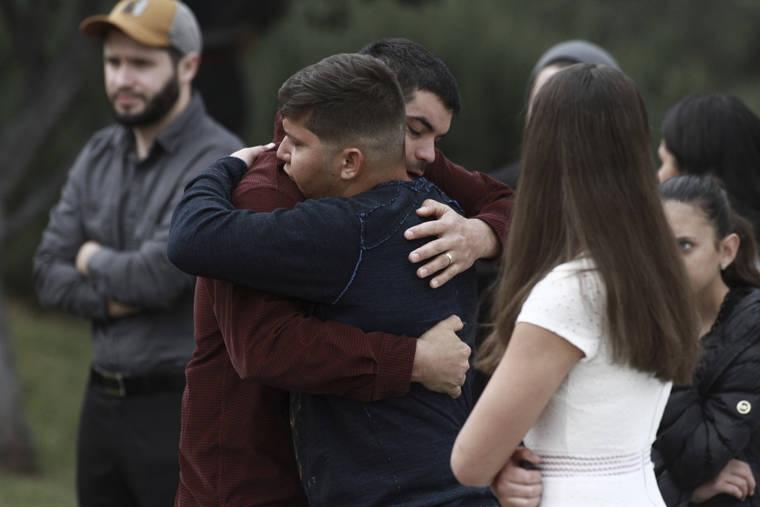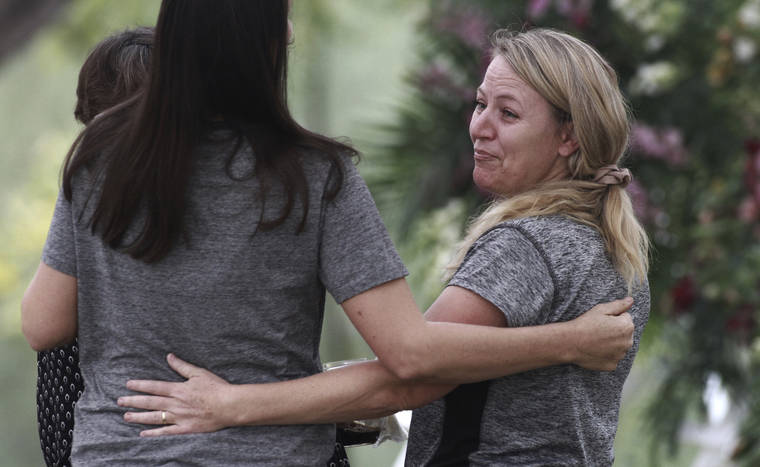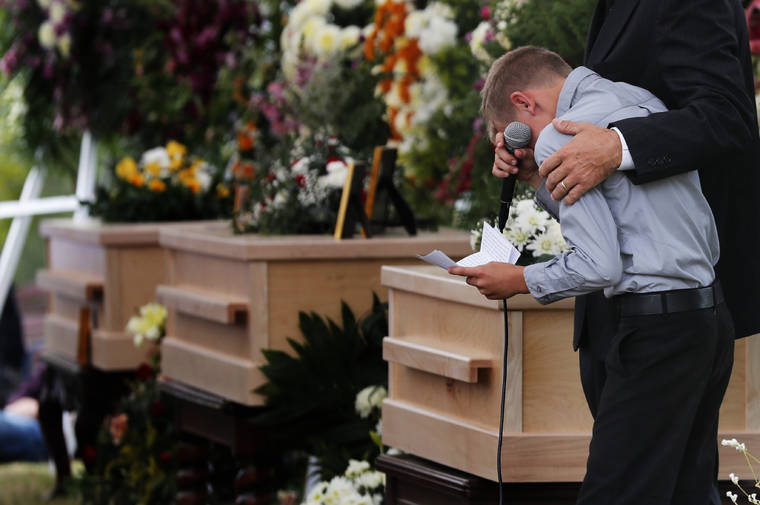LA MORA, Mexico — With Mexican soldiers standing guard, a mother and two sons were carried to the grave in hand-hewn pine coffins Thursday at the first funeral for the victims of a drug cartel ambush that left nine American women and children dead.
Clad in shirt sleeves, suits or modest dresses, about 500 mourners embraced in grief under white tents erected in La Mora, a hamlet of about 300 people who consider themselves Mormon but are not affiliated with The Church of Jesus Christ of Latter-day Saints. Some wept, and some sang hymns.
Members of the extended community — many of whom, like the victims, are dual U.S-Mexican citizens — had built the coffins themselves, and used shovels to dig a single, large grave for the three in the rocky soil of La Mora’s small cemetery. Farmers and teenage boys carried the coffins.
The coffins were placed on low tables, and mourners filed past to view the bodies and pay their last respects to Dawna Ray Langford, 43, and her sons Trevor, 11, and Rogan, 2.
They were to be laid to rest together, just as they died together Monday when attackers fired a hail of bullets at their SUV on a dirt road leading to another settlement, Colonia LeBaron, in neighboring Chihuahua state. Six children and three women in all were killed in the attack on the convoy of three SUVs.
There was no talk of revenge in this highly religious community, only a deep thirst for justice.
“The eyes of the world are upon what happened here, and there are saints all over this world whose hearts have been touched,” Jay Ray, Dawna’s father, said in a eulogy.
“The plan of God is for his saints to gather out from among the wicked, become separate from them, to band together to establish together the laws of respect and onedom,” Jay Ray said. “God will take care of the wicked.”
Dawna’s younger sister Amber Ray, 34, eulogized her as a devoted mother to her 13 children and homemaker who loved a good laugh and baked the best birthday cakes around.
“There isn’t anything in life that a cup of coffee couldn’t make better,” Amber said Dawna was fond of saying.
The hamlet is about 70 miles (110 kilometers) south of the Arizona border, where American-style frame houses alternate with barns and orchards.
Patrols of Mexican army troops passed by regularly on the hamlet’s only paved road, providing security that was lacking the day of the killings.
The other victims are expected to be buried in Colonia LeBaron later. But the two communities, whose residents are related, drew together in a show of grief.
Dozens of high-riding pickups and SUVS, many with U.S. license plates from as far away as North Dakota, arrived in La Mora for the funeral, traveling over the dirt road where the attack occurred.
Gunmen from the Juarez drug cartel had apparently set up the ambush as part of a turf war with the Sinaloa cartel, and the U.S. families drove into it.
Steven Langford, who was mayor of La Mora from 2015 to 2018 and whose sister Christina Langford was one of the women killed, said he expects the slayings to lead to an exodus from the community.
“Now this place is going to become a ghost town,” he said. “A lot of people are going to leave.”
Mexican officials said the attackers may have mistaken the group’s large SUVs for those of a rival gang. “They let the children go, so we can deduce that it was not a targeted attack” on the families, said the army’s chief of staff, Gen. Homero Mendoza.
But Julian LeBaron, whose brother Benjamin, an anti-crime activist, was killed by cartel gunmen in 2009, disputed that.
“They had to have known that it was women and children,” he said. He said the eight children who survived reported that one mother got out of her SUV and raised her hands and was gunned down anyway.
To many, the bloodshed seemed to demonstrate once more that the government has lost control over vast areas of Mexico to drug traffickers.
And it called into question President Andrés Manuel López Obrador’s “hugs, not bullets” security strategy of trying to solve underlying social problems instead of battling drug cartels with military force.
It was also the latest shocking act of cartel violence to suggest that the old rules against killing foreigners, women or children are collapsing.
“The country is suffering very much from violence,” said William Stubbs, a pecan and alfalfa farmer who serves on a community security committee in Colonia LeBaron. “You see it all over. And it ain’t getting better. It’s getting worse.”
———
Associated Press Writer Maria Verza contributed to this report from Mexico City.




